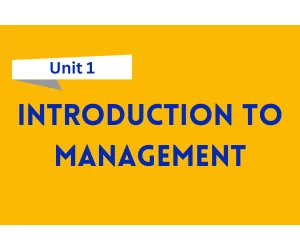Welcome to your BBA 1st Semester study guide! This page offers downloadable notes for Unit 1 of Introduction to Management.
If you’re wondering what management is all about or why it’s the foundation of your BBA journey — you’re in the right place!
Explore the units below for detailed content. Want’s to explore more subjects – Study Hub Zone
Download Unit 1 PDF – Introduction to Management
Click below to download the full Unit 1 notes in PDF format, perfectly tailored for your BBA 1st Semester curriculum:
⬇️
Download Unit 1 PDF Now
What is Management?
In simple terms, management refers to the process of planning, organizing, staffing, directing, and controlling resources to achieve organizational goals efficiently and effectively.
In this unit, you’ll explore the definition, nature, and scope of management, and understand why it’s essential in every organization — from startups to multinational corporations.
Evolution of Management Thought
Management has evolved significantly over the years. You’ll learn about early contributors like Frederick W. Taylor, who introduced Scientific Management, and Henri Fayol, who proposed the famous 14 Principles of Management.
These historical developments form the backbone of modern management practices.
Levels and Types of Management
Managers exist at different levels – top, middle, and lower – each playing a distinct role. You’ll explore the types of managers, their responsibilities, and how they contribute to organizational success.
From CEOs to team leaders, understanding the levels of management helps you see how organizations are structured.
Roles and Skills of Managers
Every manager wears many hats. In this unit, you’ll study Mintzberg’s managerial roles and essential managerial skills like communication, decision-making, leadership, and technical know-how.
This section helps you understand what makes an effective manager in today’s dynamic business world.
Management vs. Administration
You’ll also explore the classic debate: What’s the difference between management and administration?
While management focuses on execution and operations, administration is more about setting policies and planning.
Knowing this distinction clarifies how businesses and government bodies operate differently.
Is Management a Science, an Art, or a Profession?
This interesting topic examines whether management is based on universal principles (science), creativity and intuition (art), or professional standards and ethics (profession).
Spoiler: It’s actually a combination of all three!
Management Functions
At the core of this unit are the five functions of management:
Planning: Setting goals and deciding how to achieve them
Organizing: Structuring tasks and resources
Staffing: Hiring and developing the right people
Directing: Leading and motivating employees
Controlling: Monitoring progress and making corrections
Mastering these functions is key to understanding how businesses run smoothly.
Principles of Management
Dive deeper into Fayol’s 14 Principles of Management – like division of work, authority, discipline, and unity of command.
You’ll also learn about Taylor’s Scientific Management, which emphasizes efficiency, time studies, and standardization.
These principles still guide managers today.
Modern Challenges in Management
In today’s world, managers face many new challenges, including:
Globalization: Managing diverse teams and international markets
Technology: Adapting to automation and digital tools
Ethics: Making decisions that are morally and socially responsible
Sustainability: Ensuring long-term environmental and economic well-being
Understanding these challenges prepares you for future leadership roles.
Final Thoughts
Unit 1 of Principles of Management is more than just theory — it’s the foundation of how every business functions. These notes are written in clear, student-friendly language, perfect for quick revision and exam prep.
Make sure to bookmark this page and share it with your classmates!

